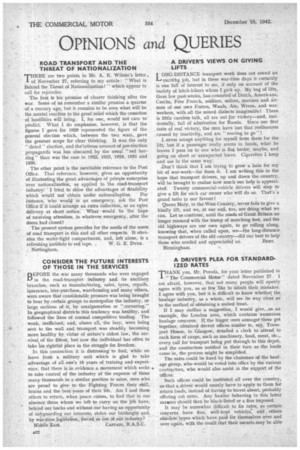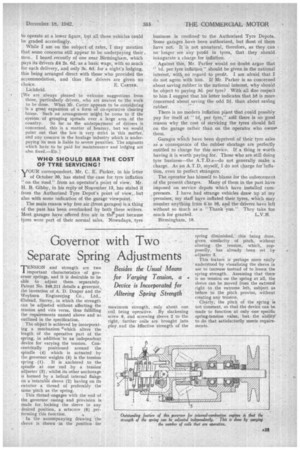OPINIONS and QUERIES ROAD TRANSPORT AND THE THREAT OF NATIONALIZATION
Page 24

Page 25

If you've noticed an error in this article please click here to report it so we can fix it.
THERE are two points in Mr, A. R. Wilson's letter. .1 of November 27, referring to my article : " What is Behind the Threat of Nationalization? " which appear to call for rejoinder.
The first is his promise of clearer thinking after the war. Some of its remember a similar promise a quarter of a century ago, but it remains to be seen what will be the mental reaction to the great relief which the cessation of hostilities will bring. I, for one, would not care to predict. What I do emphasize, however, is that the figures I gave for 1929 represented the figure of the general election which, between the two wars, gave the greatest scope for clear thinking. It was the only " dated " election, and theintense amount of pre-election propaganda was less obscured by the usual "red herring" than was the case in 1922, 1923, 1924, 1931 and 1935. .
The other point is the inevitable reference to the Post Office. That reference, however, gives an opportunity of illustrating the great advantages of private enterprise over nationalization, as applied to the road-transport industry: I tried to shOw the advantages of flexibility which would not obtain under nationalization. For instance, who woula in an emergency, ask the Post Office if it could arrange an extra collection, or an qrtra delivery at short notice. What would be the hOpe of receiving attention, in whatever emergency, after the doors had closed?
The present system provides for the needs of the users of road transport in this and all other respects. It obviates the water-tight compartment, and, left alone, is a
refreshing antidote to red tape. W. G. E. DYER.
, Nottingham. '
CONSIDER THE FUTURE INTERESTS OF THOSE IN THE SERVICES BEFORE the war many thousands who were engaged in the road-transport industry and its ancillary branches, such as manufacturing, salei, tyres, repaiis, insurance, hire-purchase, warehousing and many others, were aware that considerable pressure was being brought to bear by certain groups to monopolize the industry, or large sections of it, by amalgamation or "cornering." In geographical districts this tendency was healthy, and followed the lines of normal competitive trading. The weak, inefficient, and, above all, the lazy, were being sent to the wall and -transport was steadily becoming more healthy by virtue of nature's oldest law, the survival of the fittest, but now the individual has often to take his rightful place in the struggle for freedom.
In this connection it is distressing to find, while on leave froth a military unit which is glad to take advantage of all one's 18 years of training and experience, that there is in evidence a movement which seeks to take control of the industry at the expense of those manythousands in a similar position to mine, men who are proud to give to the Fighting Forces their skill, brains and the best years of their life. Am I and these others to return, when peace comes, to find that in our absenc those whom we left to carry on tire job have, behind our backs and without our having an opportunity of safeguarding our interests, stolen our birthright and, by wU'r-tinre legislation forced ,us out of our industry?
Middle East. . CAPTAIN, R.A.S.C. A DRIVER'S VIEWS ON GIVING LIFTS ONG-DISTANCE transport work does not sound an .1--4excitifig job, but in these war-time days it certainly is one full of interest to me, if only on account of the variety of hitch-hikers whom I pick up. My bag of lifts, these few past weeks, has consisted of Dutch, Americans, Czechs, Free French, soldiers, sailors,, marines and airmen of our own Forces, Waafs, Ats, Wrens, and warworkers, with all the mixed dialects imaginable I There, is little careless talk, all are out or victory—and, incidentally, full of admiration for Russia. Since our first taste of real victory, the men have lost that restlessness caused by inactivity,. and are "roaring to go " !
1 never accept anything for myself from them for the lift, but if a passenger really seems in funds, what he leaves I pass on to one who is flat broke, maybe, and going on short or unexpected leave. Cigarettes I keep and use in the same way.
Don't think that I am trying to grow a halo for my bit of war-work—far from it. I am writing this in the hope that transport drivers, up and down the country, will be brought to realize how much our help is appreciated. Twenty commercial-vehicle drivers will stop to give a lift for each car owner who will do so. That's 'a grand ratio in our favour ! • • Queen Mary, in the West Country, never fails to give a kindly lift, and we, at our end, too, are doing what we can. Let us continue, until the roads of Great Britain no longer resound with the tramp of marching feet, and the old highways are our own again, to go rolling along, knowing that, when called upon, we—the long-distance transport drivers of the old country—did our best to help
those who needed and appreciated us. BERT. Birmingham.
A DRIVER'S PLEA FOR STANDARDIZED RATES THANK you, Mr. Peroda, for your letter published in
" The 'Commercial Motor" dated November 27. I am afraid, however, that not many people will openly agree with you, as so few like to admit their mistakes. I agree with you, but it is difficult to know whether the haulage industry, as a whole, will see its way clear as to the method of obtaining a united front.
If I may outline a suggestion, I would give, . as an example, the London area, which contains numerous haulage concerns. If, the bigger ones amongst these got together, obtained decent offices similar to, say, Transport House, in Glasgow, detailed a clerk to attend to each form of cargo, such as machinery, food, meat, etc., every call for transport being put through to this depot, and the contractors notified in their turn as the loads come in, the process might be simplified.
The rates could be fixed by the chairman of the haulage group, who would be voted into office by the various contractors, who would also assist in the support of the offices..
Such offices could be instituted all over the country, so that a driver would merely have to apply to them for return loads, instead of having to travel about, probably offering cut rates. Any haulier behaving in this latter meaner should then be black-listed or a fine imposed.
It may be somewhat difficult to fix rates, as certain concerns have fine, well-kept vehicles: and others olaSolete types which have paid for themselves over and over again, with the result that their owners may be able
to operate at a lower figure, bqt all these vehicles could be graded accordingly. ••
While I am on the subject of rates, I May mention that some concerns still appear to be underpaying their. men. I heard recently of one near Birmingham, which pays its drivers E4 2s. 6d. as a basic wage, with so much for each delivery, and only 3s. 6d. for a night's lodging, this being arranged direct with those who provided the accommodation, and 'thus the drivers are given no choice. E. CARTER. Lichfield.
[We are always pleased to welcome suggestions from those, particularly drivers, who are nearest to the work to be done. What. Mr. Carter appears to be considering is a great expansion of a form of co-operative clearing house. Such an arrangement might be come to if the system of grouping spreads over a large area of the country. So far as the underpayment of drivers is concerned, this is a matter of hearsay, but we would point out that the law is very strict in this matter,' and any concern in the haulage industry which is underpaying its men is liable to severe penalties. The amounts which ha4e to be paid for maintenance and lodging are also fixed.—E.] WHO SHOULD BEAR THE COST OF TYRE SERVICING?
YOUR correspondent, Mt. C. E. Parker, in his letter of October 20, has stated the case for tyre inflation "on-the road" from an operator's point of view. Mr. H. B. Gibby, in his reply of November 13, has stated it from the Authorized Tyre Depot's point of view, but also with some indication of the garage viewpoint.
The main reason why free air (from garages) is a thing of the past has been overlooked by both these writers. Most garages have offered free air in th?past because tyres were part of their normal sales. Nowadays, tyre
business is confined to the Authorized Tyre Depots. Some garages have been authorized, but rhost of them have not. It is not unnatural, therefore, as they can no longer see any profit in tyres, that they should, inaugurate a charge for inflation.
Against this, Mr. Parker would no doubt argue that "Id. per tyre inflation," should be given in the national interest, with‘no regard to profit. I am afraid that I do not agree with him. If Mr. Parker is so concerned -about saving rubber in the national interest, why should he object to paying 3d. per tyre? With all due respect to him I suggest that his letter indicates that he is more Concerned about saving the odd 2d. than about saving 'rubber.
There is no modern inflation plant that could possibly pay for itself at •" Id: per tyre," arid there is no good reason why the cost of servicing the tyres should fall on the garage rather than on the operator who ownse
them. . •
Garages which have been deprived of thekr tyre sales ai a consequence of the rubber shortage are perfectly entitled to charge for this service. If a thing is worth having it is worth paying for. Those who are still doing tyre business—the A.T.D.s—do not generally make a charge. As an A.T.D, myself, I do not charge for-inflation, even to perfect strangers.
The operator has himself to blame for the 'enforcement of the present charges. Many of them in the past have imposed on service depots which have installed compressors. I have had strange vehicles draw up at my premises', my staff lave inflated their tyres, which may number anything from 6 to 16, and the drivers have left without so much as a "Thank you." They take -too much for granted. L.V.B. Birmingham, 18.




















































